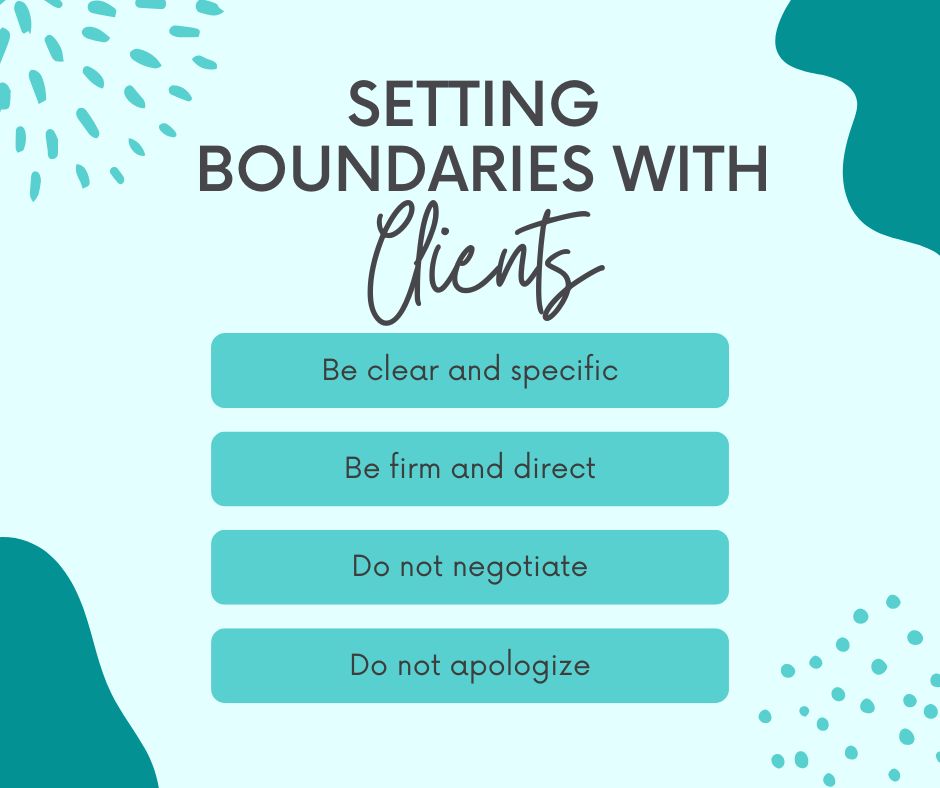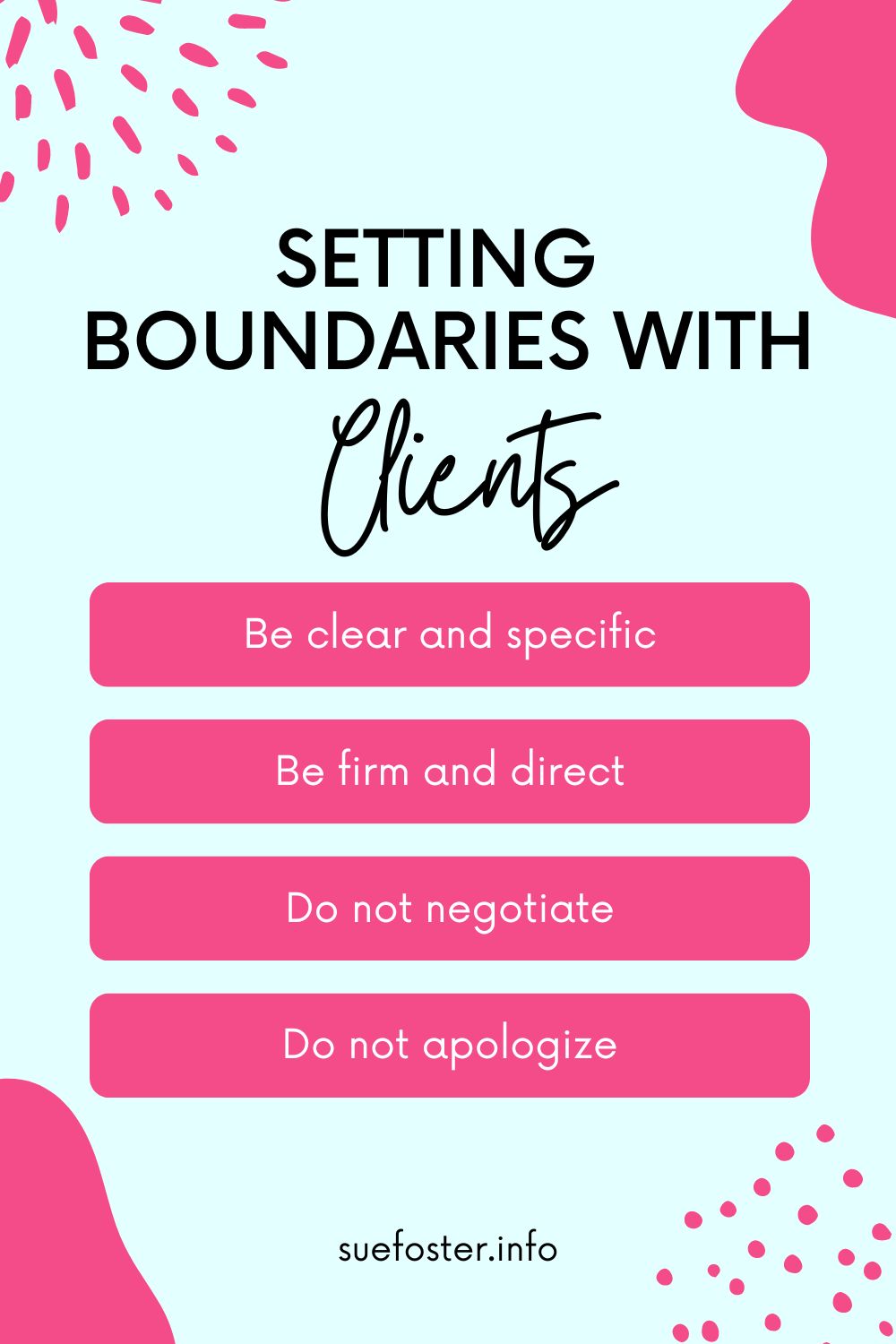“ Lack of boundaries invites lack of respect.”
~ Anonymous
Do you find yourself feeling resentful of clients who push your boundaries?
When you started your business service providing Pinterest help, coaching or whatever you do, you probably imagined a lot of freedom.
Have you lost that? I bet you didn’t go into business to let other people call the shots. Boundaries in client relationships are important, so let’s talk about setting boundaries with clients.

What are boundaries?
Boundaries are limits that we set for ourselves and others. They can be physical, emotional, or mental. Boundaries protect your time, energy and sanity!
As your needs or your client’s needs change you can change your boundaries, they aren’t static.
It’s important to set boundaries because if you don’t, your clients will do it for you and this is not the type of relationship you want to establish as a coach, virtual assistant or any job you do that services a client in some way.
Why are boundaries important?
Boundaries are important in client relationships. If you’re constantly working and neglecting your own needs, in order to “serve” your clients at their every beck and call, you will end up feeling overwhelmed, burned out and resentful.
Boundaries are important because they help you to maintain a healthy work-life balance. It’s important that you have time for yourself and setting boundaries will make sure that you’re not working all of the time.
There are many reasons why boundaries are important in client relationships. First, they help you to avoid burnout. If you’re constantly working long hours and putting your own needs on the back burner, in order to “serve” your clients at their every beck and call, you will eventually end up feeling overwhelmed, burned out and even resentful!
Second, boundaries help you to maintain a healthy work-life balance. It’s important to have time for yourself outside of work and setting boundaries can help you to make sure that you’re not working all the time.
Boundaries are also a way to establish confidentiality with your clients which is essential for building trust and ensuring your clients know that what they say (in a coaching relationship), or any business information (in a virtual assistant relationship) they share is kept in strict confidentiality.
Lastly, boundaries are important because they show your clients that you respect their time and energy (as well as yours). Your clients will start to take advantage of you if you’re always available and never say no.
If you set boundaries from the beginning, they will know that you’re serious about your time and theirs too!
There’s one more thing worth mentioning. If you feel the need, you can explain to your clients why boundary-setting is important. For example, you might say something like, “In order to provide the best possible service, it is important for me to establish some boundaries. I hope you understand.”
Ok, let’s now talk about boundaries from a couple of different situations – private coaching and service providers.
Private Coaching
When you’re coaching clients, these are intimate interactions between you and the client, this makes for an easy opportunity for conversations to go into overtime or to veer off into other areas. This can wreak havoc on not just your schedule, but your clients too!
One of the best ways to avoid this and establish a positive, clear time boundary, for both parties is to set a timer that will go off three minutes before time is up. Make sure this timer will be audible for both you and your client. You can let them know before their session starts what you’re doing and even play the alarm sound for them, so they know what to look for.
The first time you do this, it may feel a bit weird and uncomfortable, but it’s a technique that many coaches use and most report that their clients appreciate it and will jump to wrap things up gracefully before their time ends.
Ticktime Pomodoro Timer, Desk Timer Cube, Hexagon Visual Magnetic Flip Timer, Silent & Alarm, for Kids, Classroom, ADHD, Productivity, Office, Meeting, Sports, Meditation.
Of course, the audible timer doesn’t always work. There will be clients who seek extra time. They’ll say things like, “Just one more question” or “Let me finish this story.” As the coach, you get to decide whether you wish to honour their request or not. Keep in mind, if you do honour their request, they may try this tactic in the future too.
Remember, you’re showing your clients what to expect in the future! If you want calls to end crisply on time, hold the boundary firm and don’t waver on it. When a client pushes for extra time, feel free to say, “Let’s put a pin in that and pick it up on our next call.”
If you want to offer your coaching clients support between calls, Voxer is a great way to do that. The app allows you and your clients to share audio or text messages…. without using your phone number. The best thing about using Voxer instead of your phone number is that you can turn off Voxer notifications and still be fielding regular text messages from friends and family (any messaging app that can be separate from friends and family is fantastic!).
Keep in mind that if you’re going to make yourself available for quick support between calls it’s important to set a boundary about when you will be available for these. If you won’t be available to offer support in the evenings and on weekends, let them know. Then you can decide if you want clients to abstain from messaging you during these times or if they can message you, but you won’t respond to them until you’re ‘back to work’ (be sure to let them know this beforehand so they aren’t wondering why you’re not responding to them).

Service Providers
One of the biggest obstacles service providers can experience is they’ll begin working on a project only to realize the scope of the project is way bigger than described. This is known as scope creep.
There are a couple different ways this can be handled…
Choose to not say anything (not recommended!). The service provider can go on to complete the project and invoice for the original quoted price. The problem with this approach is that it often leaves the service provider feeling resentful, taken advantage of and even angry because they put way more time into the project than the time originally planned (that reflected the price they originally quoted and got paid for).
The better, and recommended, option would be to go back to the client and have a conversation about renegotiating the price, and if needed the timeframe for how long it will take to complete the project.
Having a renegotiation conversation may sound awkward, but it doesn’t have to be. If it’s taken from the approach of not pointing fingers and that the client isn’t at fault, it will go a lot smoother leaving the client more receptive and understanding (and more likely to understand why the project will cost more money to complete).
How to set boundaries as a service provider
There are a few different ways to set up boundaries as a service provider. The first step is to communicate your needs clearly. If you’re feeling overwhelmed, don’t ignore that – have a conversation with your client and explain the situation. Your client may not even realize how much they’ve been handing off to you. This conversation will help to set expectations for both you and your client.
Boundaries at Work: How to Set Healthy Boundaries at Work and Make Better Decisions in Your Career.
It’s also important to be assertive when setting boundaries. Don’t be afraid to say no if a client is asking too much of you. Remember, you’re in control of your own business and you should never feel like you have to say yes to something that doesn’t work for you.
Finally, and the most important thing to remember is to be consistent with your boundaries! As soon you start saying yes to everything or making yourself available when you said you weren’t (weekends for example), your clients will quickly catch on and begin to take advantage of your kindness.
This has happened to me in the past with a client who became demanding and was always contacting me to do work, often at weekends.
Let me share an example of a Virtual Assistant that experienced this. Lisa had just recently started offering VA services. She had three clients and was so thankful to have them but worried if she didn’t respond to their emails as soon as they came in, or if she didn’t work on their projects in the evenings and on weekends, that they would fire her. As she took on more clients, there were even times she would pull all-nighters to ensure her clients were taken care of, ignoring her need for sleep.
After three months, Lisa was ready to throw in the towel and go back to a regular 9-5 job! She was burned out, feeling resentful, and even physically sick with a cold… all because she thought she was being a great VA by always making herself available and not setting boundaries.
Thankfully, there’s a happy ending for Lisa (and her clients). She didn’t throw in the towel and go back to a job. Instead, she hired a business coach and the first thing that coach told her was she had to put some boundaries into place and let her clients know.
Today, Lisa has been successfully running her VA business for two years. She’s booked with no availability to take on new clients… and she only works 4 days a week, no evenings, and no weekends.
She’s found that her clients appreciate and respect her more now because she ‘drew that line in the sand’ (set those boundaries) and let them know these are the times I’ll be available from now on and she stuck to it!
Final Word
Setting boundaries, no matter how you’re serving clients (as a coach, virtual assistant, etc.), can be tricky but it’s important you do it from the very beginning. By communicating clearly and remaining consistent, you’re designing those positive client boundaries that work for both you and your clients.




